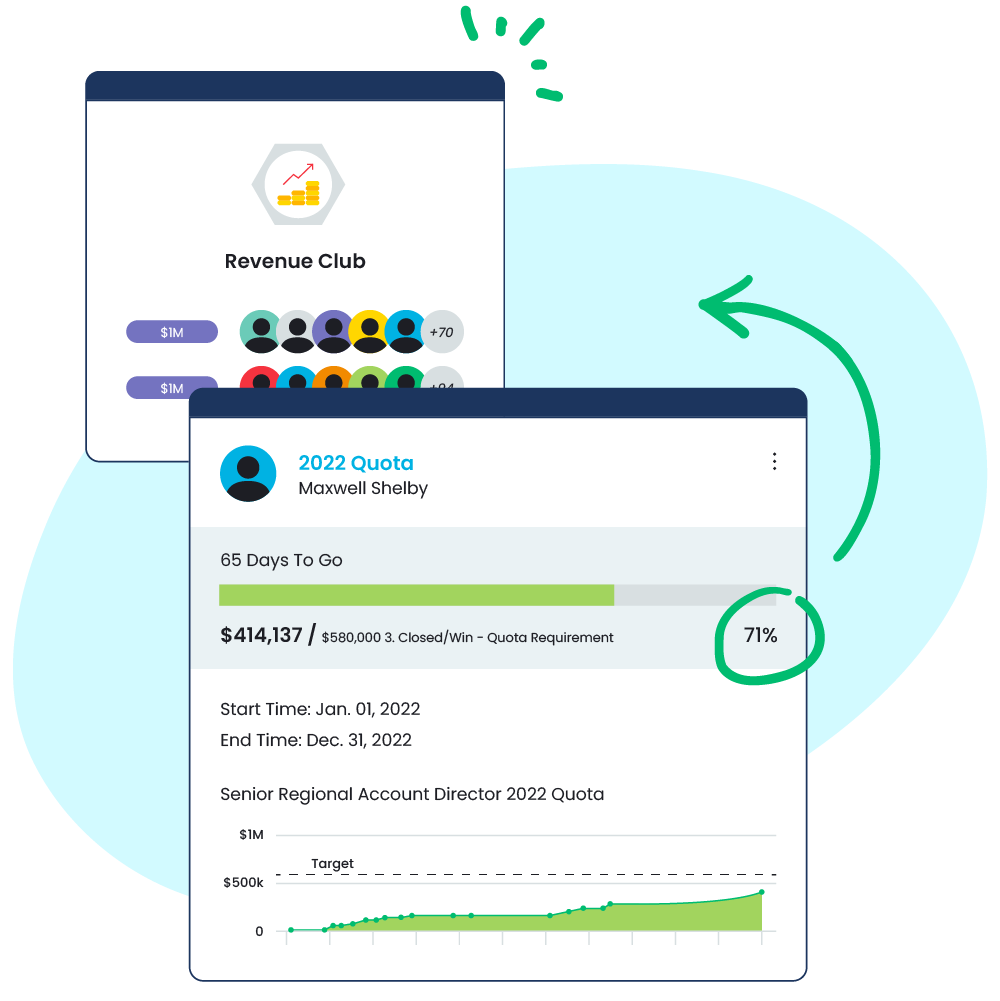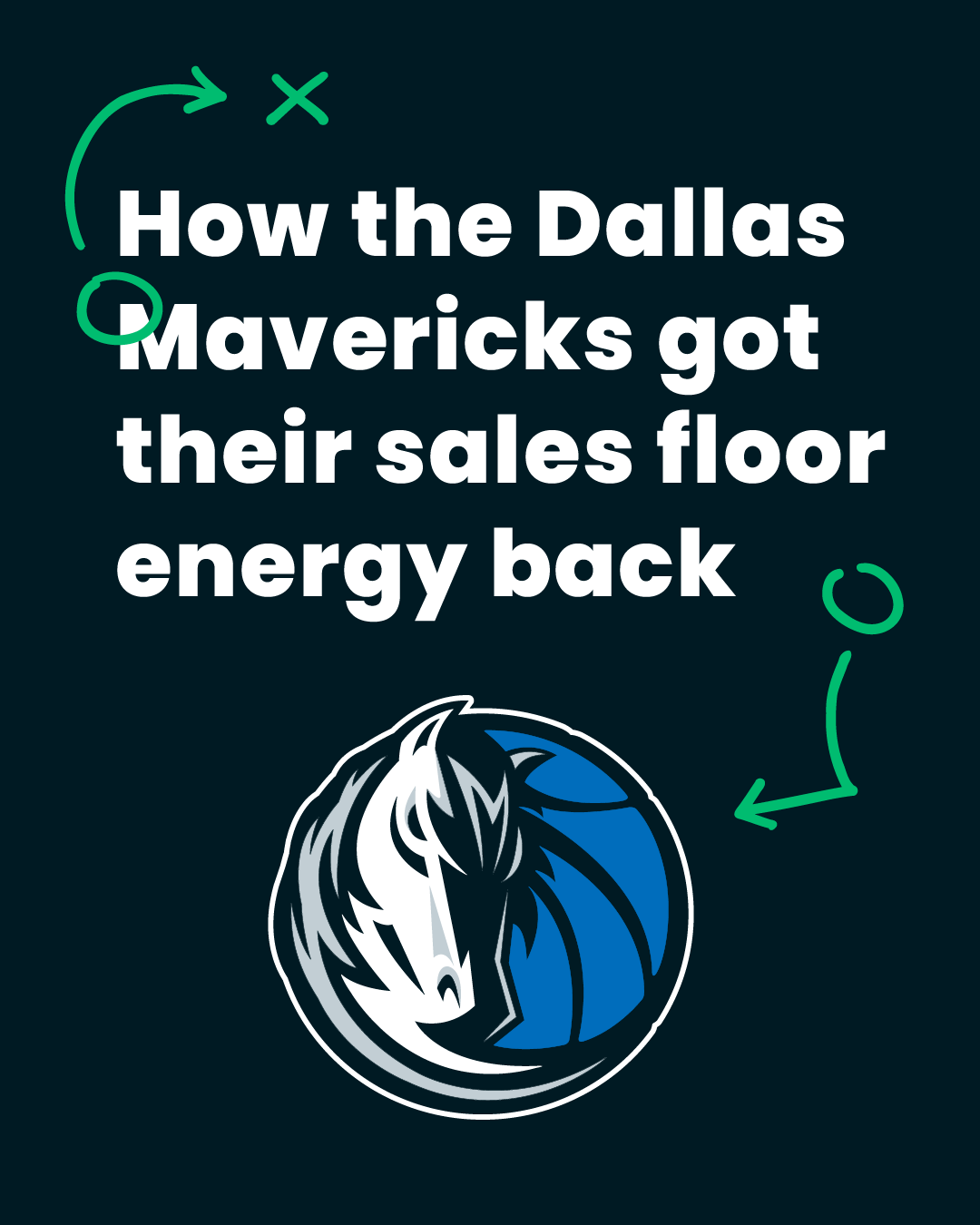Sales Team Management
Sales Team Management
When asked who in their organization has the most influence on their success, 65% of all sales reps had the same answer: their direct manager. Sales reps may be the ones putting strategies into action, but they need effective sales team management in order to truly impact business results.
Effective sales team management offers immediate benefits that ultimately lead to long-term business success. Only certain components are within a sales manager’s control, and these should be their key areas of focus. For example, sales managers can’t directly impact bottom line results. They can, however, coach their reps on the behaviors that will ultimately drive revenue. By clearly defining activities and objectives for their direct reports, sales managers influence the behaviors that lead to improved performance, higher retention, and better business results in the long run.
We know sales managers like you are strapped for time. You have 10+ direct reports, 7+ data sources to manage, and not enough bandwidth to conduct truly meaningful coaching sessions. How can you prioritize sales team management without sacrificing precious time? An investment in Rep Performance Management software enables you to incorporate more effective sales management techniques, boost rep performance and retention, and save thousands of hours per year. Here are some sales management strategies to help you optimize the way you manage your sales team.
- Set clear expectations for your reps and make metrics visible to hold everyone accountable
- Motivate your sales team to move the mark with fun competitions and incentives
- Ensure your reps’ continued development through consistent coaching
- Automate cross-functional recognition to break down silos and celebrate every win
Each of those sales management strategies contributes to a culture that keeps reps in-seat. Employee retention is critical to the longevity and health of your sales organization. A sales environment that values accountability, encouragement, coaching, and recognition will naturally attract and retain top talent—not to mention positively impact long-term business results.
An Executive Analysis
How Sales Coaching Impacts Key Business Metrics

Sales Team Management Software
Sales team management software helps managers optimize processes, create efficiencies, streamline communication, and ultimately save time. With a sales management system like Rep Performance Management, sales team managers can easily strategize, execute, and measure the key activities that help their sales team hit quota. It allows them to strategically define and track the metrics within their control in an effort to affect positive long-term results.
There are many sales management system examples, but the four elements mentioned earlier—accountability, encouragement, coaching, and amplification—are what make for an optimized sales management software. Ambition’s Rep Performance Management software was designed specifically for reps and managers alike with these key components in mind.
Integrating sales team management software into your tech stack shouldn’t feel overwhelming. Instead, it will alleviate some of the biggest pain points sales leaders like you face every day. Here are a few examples of how you can use sales team management software to save time, empower your team, and encourage behaviors that will truly move the mark.
Set clear expectations and goals for your sales team.
Define the metrics that matter and hold every rep accountable with scorecards. These help your reps understand the activities necessary to achieve every objective. Plus, you’ll have visibility into how everyone is tracking towards goals.
Lead coaching sessions with data.
Coaching software automatically pulls metrics from scorecards to make 1:1s more informed and efficient. It also reduces manual prep time by 80%—which gives managers back 7 hours per week to spend on high-value activities.
Keep your team motivated and connected through friendly competition.
Gamifying sales helps propel your team forward and encourages them to practice key behaviors. With our encouragement toolset, you can automate a variety of competitions and reward your team when they hit goals.
Sales Team Responsibilities
If you’re managing a sales team for the first time, you’re probably wondering how to build a successful sales team. While you are likely familiar with various sales team responsibilities, it’s important to consider each individual rep on your team and how they can contribute their specific skill sets to building customer relationships that stand the test of time. This is how you impact long-term revenue growth.
When you consistently coach your reps, you develop a clear understanding of their strengths and weaknesses. As you help them set goals and offer training opportunities in their weaker areas, consider how you can capitalize on what they already do well. For example, as your reps continue to build their knowledge of the products and services they’re selling, encourage them to continue dialing and setting meetings to warm up the lead. By the time they have that meeting, not only will they have a deeper understanding of products and services. They’ll also have more experience under their belt when it comes to calling, emailing, and building customer relationships.
You’ll have to strike the balance between giving your team goals that feel both challenging and attainable. This way, they continue to grow while positively impacting your organization with the skills they already have. As their sales manager, it’s your job to enable them with the tools they need to advance while empowering them to take ownership of what they already do best. This is the art of managing a sales team.
Take every personality, skill set, and individual into account when structuring your sales team. Assign clear responsibilities based on how your reps work best and how they work together. You’re all after a common goal, but breaking down that larger objective into actionable steps for every rep is critical. Make sure each member on your sales team understands what their responsibilities are and what steps they need to take in order to achieve the larger objective. When you give reps opportunities that play on their strengths, you position your entire organization towards greater success.
Sales Manager Responsibilities
A good sales manager breeds a high-performing sales team. So what are the qualities and responsibilities of a sales manager? Your main job is to unlock your reps’ potential by empowering them with what they need to drive pipeline and revenue for your organization.
Here are 10 management skills that make the best managers stand out. Put these sales manager responsibilities into practice to optimize the way you manage sales team roles and responsibilities.
10 Management Skills that Make the Best Managers Stand Out
- Be transparent
Work closely with your reps to set clear expectations and goals. Keep data visible so everyone knows how they’re tracking toward goals. This keeps people motivated and aligned on the larger objective.
- Foster accountability
Define the success metrics for your team and have an objective way to measure them. Track your team’s progress in real time to keep everyone accountable, and reward them when they hit goals.
- Coach consistently
Your people are your greatest business assets, and investing in them matters. Regular coaching not only sets them (and your whole sales org) up for long-term success, it also improves retention.
- Give actionable feedback—and ask for it, too
Reps can only improve if you offer clear, actionable feedback. Record this in 1:1 sessions. Invite feedback from your reps, too, so you can provide optimal management.
- Make work fun
Gamify sales to motivate and engage everyone on your team. Competitions encourage camaraderie, teamwork, benefit long-term performance, and contribute to a fun culture.
- Celebrate and reward success
With automated recognition, you never miss an opportunity to celebrate. Set up real-time alerts when your sales team hits certain goals. This shows reps that you value their good work and encourages them to cheer each other on.
- Break down silos
Whether you include different departments in your competitions, amplify recognition via cross-functional channels, or facilitate mentorship between new and seasoned employees, fostering community gives everyone a sense of belonging.
- Incentivize your team
Motivate your team with incentives like enticing commission structures, physical prizes, or team outings. Directly link key behaviors to physical rewards to encourage long-term adoption.
- Build a strong culture
In a remote work environment, culture is more important than ever. Invest in your people by creating a culture that both attracts and retains top-performing reps.
- Empower your team with data
Implement software and processes that make real-time data accessible to everyone. This will keep your reps motivated and excited, hold them accountable, and encourage them to celebrate everyone’s success.
What Makes a Successful Sales Team
What makes a successful sales team? Sales managers are the driving force behind their sales teams—so building a strong sales team begins by empowering the frontline sales managers.
It’s no secret that sales team managers have a lot on their plate. They are often overwhelmed by nearly a dozen direct reports, too many systems to manage, and data coming from multiple sources. They struggle to retain reps, lack ample time for strategy and planning, and aren’t sure how to optimize sales performance.
Ambition’s Rep Performance Management software encompasses every tool a sales manager needs to build and enable a healthy sales team, all while maximizing their own capacity for high value activities. They can spend less time collecting and synthesizing data and more time coaching their people, developing new go-to-market strategies, analyzing pipeline and at-risk deals, and so much more.
Strong sales team management can make any sales team successful. But the key to ensuring your sales organization’s long-term results is to build a positive culture. At the end of the day, reps simply won’t perform well if they feel lost in the shuffle or undervalued. They can’t reach their peak performance if they aren’t coached properly or given opportunities to grow.
With a streamlined sales performance management software, managers have more time to focus on what really matters—investing in their people. This is critical to boosting rep performance and retention. Data shows that Rep Performance Management software improves retention by 25% to 55% over 3 years. A high retention rate will save your organization hundreds of thousands of dollars in the long run. When you build a sales environment that values people and appreciates their unique strengths, people are naturally more motivated and invested in their work.



